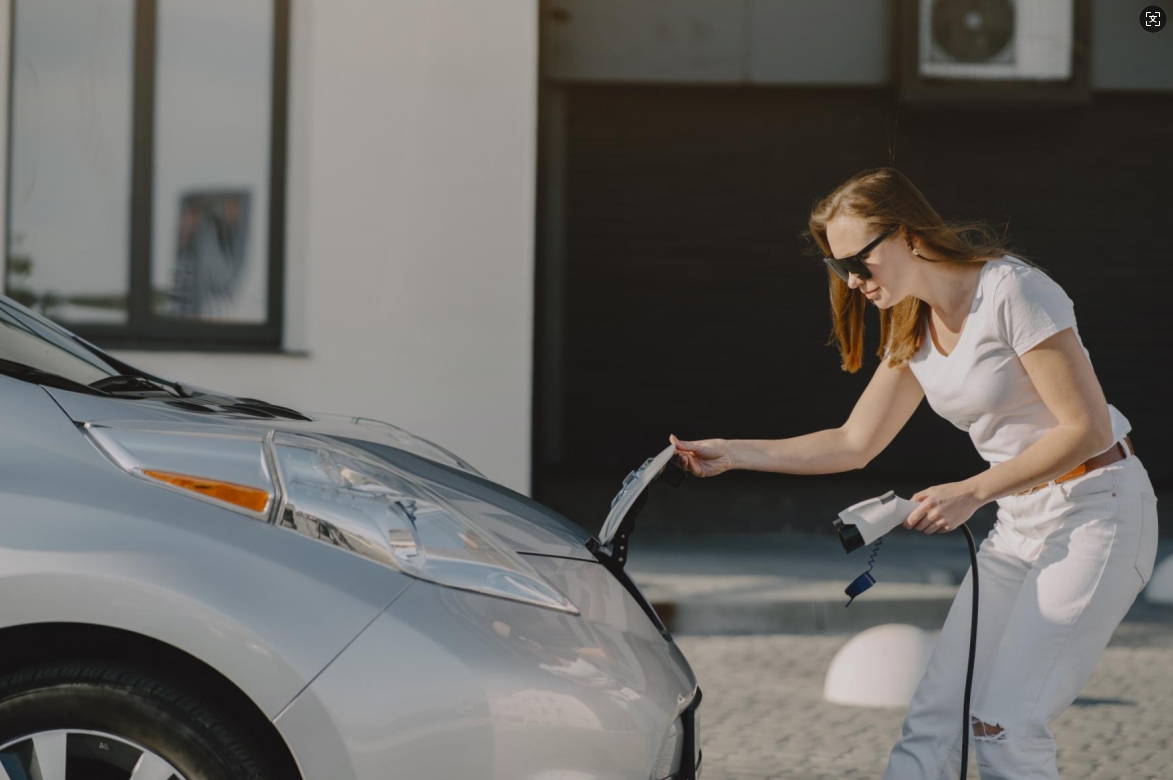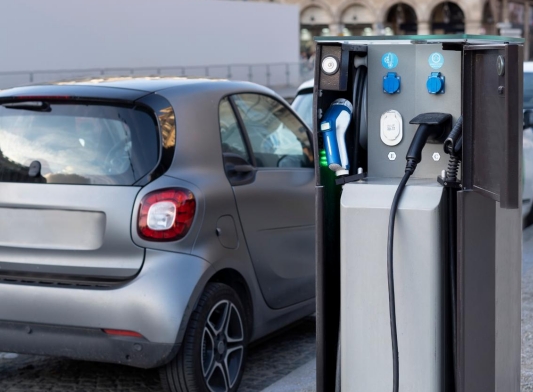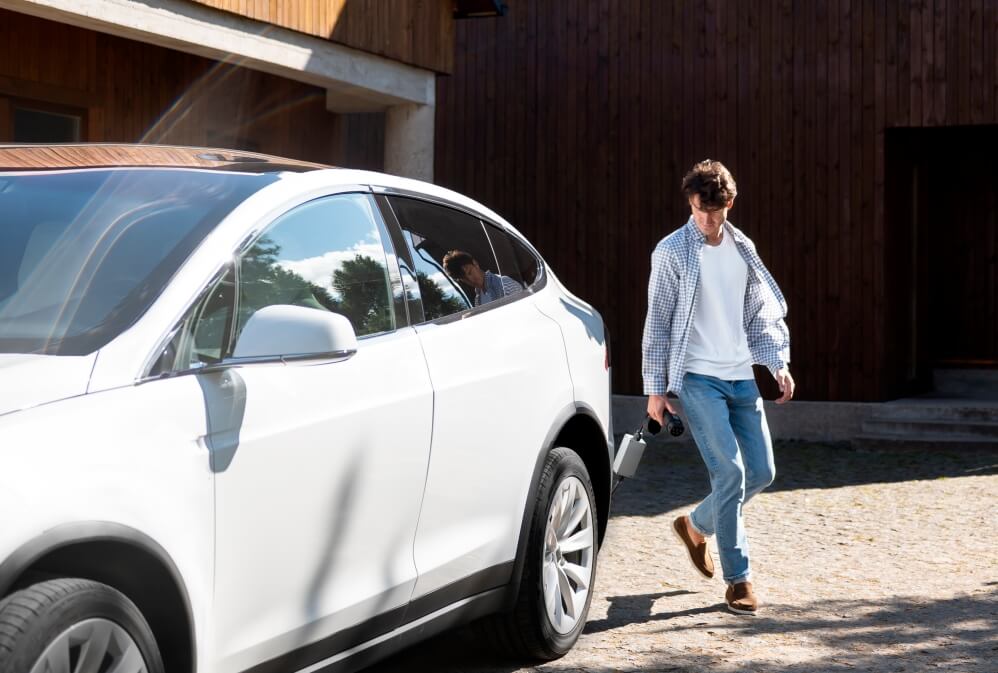Portable Car Chargers vs. Public Charging Stations: Which is More
As electric vehicles (EVs) continue to grow in popularity, finding an efficient charging solution is critical for EV owners. Two key choices among the many charging options are portable car chargers and public charging stations. Both have pros and cons, but the question is: which is more practical?
What is a Portable Car Charger?
Portable car chargers are lightweight, compact devices that can be used to charge your electric vehicle anywhere there is an electrical outlet. These chargers typically range from 3.5kW to 7kW, and their portability allows EV owners to charge their cars at home or on the road.

Advantages of Portable Car Chargers
- Convenience: According to an EVBox 2021 survey, 74% of EV drivers charge their vehicles at home. Portable car chargers can be plugged in at different locations, whether at home or on the go. You don’t have to rely on public charging stations, which sometimes have queues or are unavailable.
- Cost savings: Charging at home with a portable charger is much cheaper than at a public charging station. For example, in the United States, the average cost of charging at home is $0.13 per kilowatt hour, compared to $0.30 to $0.50 per kilowatt hour at public charging stations, especially DC fast chargers. Over the lifetime of an electric vehicle, hundreds or even thousands of dollars can be saved by charging primarily at home using a portable car charger.
- Emergency Backup: Having a portable charger can be a lifesaver if you run out of power away from a public charging station. About 10 percent of electric vehicle owners report having mileage anxiety. Most electric car owners report having mileage anxiety. Portable chargers can reduce this anxiety by providing charging options in areas that lack public charging stations.
Limitations of Portable Car Chargers
- Charging speed: Portable car chargers typically charge at 3.5kW to 7kW, which means they can add around 20-30 miles of range per hour of charging. In contrast, DC fast chargers can deliver up to 250kW of power, adding up to 200 miles of range in as little as 20 minutes. While portable chargers are great for nighttime charging, they may not be fast enough for EV owners who need to charge quickly during the day. While portable chargers are great for nighttime charging, they may not be fast enough for EV owners who need a quick charge during the day. While portable chargers are great for nighttime charging, they may be too slow for EV owners who need a quick charge during the day. While portable chargers are great for nighttime charging, they may be too slow for EV owners who need a quick charge during the day.
- Use an electrical outlet: The portable charger requires a compatible electrical outlet (usually 110V or 240V). If your home does not have a high-capacity outlet, charging may be slow.
- Upfront Cost: Portable chargers come with an initial purchase price, usually between $200 and $600. While this is a one-time cost, it’s important to factor it in when calculating long-term savings.
What are Public Charging Stations?
Growing public charging stations in cities, motorways, and shopping centers offer Level 2 charging (typically 7kW to 22kW) and DC fast charging (50kW to 350kW). These stations allow for fast charging, especially during long journeys.
Advantages of Public Charging Stations
- High-Speed Charging: DC fast chargers can provide up to 200 miles of range in 15-30 minutes. According to the U.S. Department of Energy, DC fast chargers are ideal for long-distance travel, enabling drivers to recharge during breaks quickly.
- Widespread Availability: As of 2023, the U.S. has over 53,000 public charging stations and over 140,000 charging ports. The global EV charging infrastructure market is expected to grow from $11.9 billion in 2020 to $45.8 billion by 2027, ensuring more widespread access.
- Perfect for Long Trips: On road trips, public charging stations are often located along major highways, providing a convenient option for fast top-ups. According to PlugShare, a popular charging station locator app, EV drivers can find public chargers at over 100,000 locations globally.
Limitations of Public Charging Stations
- Public Charging Station Costs: Charging a vehicle at a public charging station can be much more expensive than charging at home. For example, in California, charging at some public DC fast chargers can cost as much as $0.50 per kilowatt hour, almost four times the rate for home charging. Over time, this can add hundreds or even thousands of dollars to the cost of using your electric vehicle.
- Waiting times and availability: Public chargers are sometimes in high demand, especially in urban areas. A study by the International Council on Clean Transportation (ICCT) showed that charging stations in some high-traffic areas are often congested, resulting in long waiting times.
- Limited access in rural areas: While public charging infrastructure expands, rural areas may not be fully covered. A U.S. Department of Energy 2022 study found that 80 percent of public charging stations are in metropolitan areas, leading rural EV owners to rely more on home charging solutions.
Cost Comparison: Portable Car Charger vs. Public Charging Stations
When considering the impact of the cost of use, it is necessary to compare portable car charger costs with ongoing public charging station costs:
- Portable Car Charger Costs: A portable charger generally costs between $200 and $600 to purchase. If you charge at home, you’ll pay the residential electricity rate, which averages around $0.13 per kWh in the U.S. For a vehicle with a 60kWh battery, a full charge at home would cost roughly $7.80. Over the course of a year, charging an EV 15,000 miles at home could cost about $500, assuming an average consumption of 4 miles per kWh.
- Public Charging Station Costs: In contrast, public charging stations, especially DC fast chargers, can charge upwards of $0.30 to $0.50 per kWh. That same 60kWh battery would cost between $18 and $30 to charge at a public station fully. Annually, this could amount to $1,200 to $1,800 if public charging is your primary method of recharging, a significant increase compared to home charging.
Which is More Practical for Your Needs?
Daily Commuters
The portable car charger is more practical for commuters who primarily drive short distances (often traveling between home and work). Since you can easily charge overnight at home, you save on high public charging station fees, and your car is fully charged every morning. This is perhaps the most economical option for those who don’t travel long distances often.
Long-Distance Travelers
Public charging stations are the best option for frequent road trips. Quick charging with a DC fast charger reduces the waiting time for drivers. However, you may still need to carry a portable onboard charger for emergencies or situations where charging infrastructure is limited.
Rural or Remote Drivers
A portable car charger or home charging post is essential if you live in a rural area with limited public charging infrastructure. While the number of public charging stations is increasing, they are still scarce in many non-urban areas. Portable chargers provide reliability and peace of mind for rural EV owners.
Urban Dwellers
Urban drivers benefit from the widespread use of public chargers. However, public charging station costs can be high, especially if DC fast chargers are frequently used. A hybrid approach using public and home portable chargers may provide the best balance between cost and convenience.
Conclusion
Both portable car chargers and public charging stations have obvious benefits, but their practicality depends greatly on your personal driving patterns. Portable car chargers are usually the more practical solution for those prioritizing cost and convenience. On the other hand, public charging stations are perfect for those needing to charge quickly, especially during long journeys. Ultimately, many EV owners may find combining these options offers the most flexibility and savings.
Assess your driving habits and charging needs. To minimize costs, consider purchasing a portable car charger and using public chargers only when necessary.
Last Updated on October 28, 2024 by tayniu



